North Carolina War Between the States Sesquicentennial
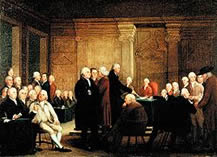
North Carolina's First & Second Secession
Counting North Carolina's withdrawal from the British Empire after the Revolution and Treaty of Paris which
recognized the political independence of each of the Thirteen Colonies, North Carolina then withdrew from
the Articles of Confederation. Both North Carolina and Rhode Island stayed outside of the new political
arrangement referred to as the "United States Constitution" for a short period, and maintained themselves
as independent republics outside of the United States.
The Second Secession:
“In May of 1788, [George] Washington, hearing from Richard Dobbs Spaight of the
great opposition in North Carolina to the proposed government [to supersede the Articles of Confederation],
was deeply concerned. [H]e wrote he would be truly astonished if that State withdrew from the union.
The Federalists lost no opportunity to present a gloomy picture of conditions under the Articles of Confederation,
and the many benefits anticipated from the proposed Constitution. As ratification took place in one State after
another, it was predicted that deplorable conditions would arise if North Carolina were separated from the union.
To counteract the charges of monarchical tendencies [of increased federal power], attention was called to the
minority in the ratifying States who were willing to trust the work of amendment to the members of Congress
under the new government. The anti-federalists especially emphasized the absorption
by central government of State powers.”
(The Federal Constitution in North Carolina, Trenholme, pp. 137-138)
The Question of Political Secession
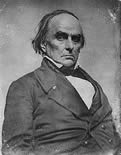
"If the Union was formed by the accession of States, then the Union may be dissolved by the secession of States."
Daniel Webster, on the floor of the US Senate 15 February, 1833
An irony in American history has the doctrine of secession originating in the South when
it was first advanced by New England over the issue of Louisiana’s admission to Statehood.
Jefferson and Madison, both Southerners, opposed secession; New England Federalists demanded it.
New England Federalists and their Secession Doctrine
“The final political phenomenon to arise out of the North-South competition of the 1790s was
the doctrine of Secession. It represented the death rattle of the Federalist party. The pivotal year
was 1800 when the Democratic leaders Jefferson and Burr succeeded in putting together a
coalition of the have-nots of the country – the agriculturalists of the South and the proletarians
of the Northern cities. They won control of the nation.
The Federalist party survived another sixteen years, although it never again won control of the House,
Senate or presidency. It did not take defeat well.
Barely three years after the Democratic rout, Northern Federalists began arguing for the
secession of the New England States from the Union. There was nothing understated
about their secessionist position. It was widespread, and if it could not be done peaceably,
they said, it should be done violently.
Listen to one of the many secessionists, Josiah Quincy III, scion of the New England Quincy’s,
future mayor of Boston and future president of Harvard University. In 1811 he was a thirty-eight-year-old
congressman standing opposed to the admission of Louisiana as a State:
“It is my deliberate opinion,” he said, “that if this bill passes, the bonds of this union are virtually dissolved,
that the States which compose it are free from their moral obligations, and that as it will be the right of all,
so it will be the duty of some to prepare, definitely, for a separation; amicably if they can; violently if they must.”
One man who listened carefully that year was a freshman congressman from South Carolina.
He was John C. Calhoun, who had been taught the secessionist doctrine in the law schools
of New England, who had listened to it in the Congress, and who would one day carry it back
down South . . . . Meanwhile, it is an unfair stroke that history has identified the South with
secession when in fact the earliest and clearest arguments against it
were proposed by Jefferson and Madison.
The creators of secession doctrine, and the teachers of it from 1800 to 1817, were New England Federalists.”
(The Natural Superiority of Southern Politicians, Chandler, pp. 114-116)

![]()
![]()
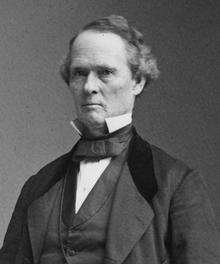
Senator Joseph Lane of Oregon, Speech in the United States Senate, March 2, 1861:
“Mr. President….I am for the Union upon the principles of the Constitution, and not a traitor. None but
a coward will even think me a traitor; and if anybody thinks I am, let him test me. [The South] will go out
of this Union and into one of their own; forming a great, homogeneous, and glorious Southern confederacy.
And it has been, Senators, in your power to prevent this; it is and has been for you to say….whether the
Union should be saved or not.
If a people of a State, believing themselves oppressed, undertake to establish a Government, independent
of which they formerly owed allegiance, and the latter interferes with the movement, and employs force
to prevent such a consummation, no one who acknowledges the great truth that the basis of free
government is the “consent of the governed,” will deny that such interference
is an act of usurpation and tyranny.
One of the framers of the Constitution….has left on record his views of the injustice, impracticability,
and inefficiency of force as a means of coercing States into obedience to Federal authority. The subject
being under consideration in the convention which framed the Constitution:
“Mr. Madison observed, that the more he reflected on the use of force, the more he doubted the
practicability, the justice, and the efficiency of it, when applied collectively, and not individually. A Union of the
States containing such an ingredient, seemed to provide for its own destruction. The use of force against a
State would look more like a declaration of war than an infliction of punishment, and would probably be
considered by the party attacked as a dissolution of all previous compacts by which it might be bound.
He hoped that such a system would be framed as might render this resource unnecessary; and moved
that the clause be postponed.” (Madison Papers, Debates in the Federal Convention, vol. 5, p.140)
Among the statesmen of the Revolution – those who participated in the formation of our Government –
there was no one who had such exalted notions of the power and dignity of the Federal Government, as
the great [Alexander] Hamilton. He was a consolidationist. The advocates of coercion might expect
to obtain “aid and comfort” from the recorded declarations of one of his political faith. But an
examination of his writings will show….[that] he was the advocate of leniency and conciliation
towards refractory States, and deprecated a resort to force as madness and folly.
He said, in a debate on this subject:
“It has been observed, to coerce the States is one of the maddest projects that was ever devised.
A failure of compliance will never be confined to a single State. This being the case, can we
suppose it wise to hazard a civil war? Suppose Massachusetts, or any large State, should
refuse and Congress should attempt to compel them, would they not have influence to procure
assistance, especially from those States which are in the same situation as themselves?
What picture does this idea represent to our view?
A complying State at war with a non-complying State; Congress marching the troops of one State into
the bosom of another….Here is a nation at war with itself. Can any reasonable man be well disposed
towards a Government which makes war and carnage the only means of supporting itself – a Government
which can exist only by the sword? Every such war must involve the innocent with the guilty.
This single consideration should be sufficient to dispose every peaceable citizen against such a Government.”
(Elliot’s Debates, vol. 2, p. 233)
(The Politics of Dissolution, Marshall L. DeRosa, editor, Transaction Publishers, 1998, pp. 308; 314-315)

"That Government of the People . . . Shall Not Perish from the Earth"
“The Deep South understood Lincoln’s sectional victory in the 1860
presidential election to be a revolutionary event that virtually abolished the confederate
republic of the founders. In withdrawing from the union, they simply removed themselves
from a government they did not want.
It took Lincoln’s declaration of war five months later to convince others of his true
intentions, prompting a second wave of secession. The sovereign people – organized as sovereign States –
had created the federal government in ratifying the Constitution. States that entered the union
of their own free will now left it in the same manner.
“The reason Lincoln gave for launching a military invasion of the South was to save
the Union,” wrote Thomas J. DiLorenzo. “Translating from his obfuscating rhetoric, this
means that he wanted to use military force to destroy once and for all the doctrines of
federalism and States’ rights that had, since the founding of the republic, frustrated
ambitious politicians like himself who wanted a highly centralized and greatly enlarged state.”
Federal troops died to preserve the union. But, Lincoln’s pious poetry to the contrary,
it was their opponents in gray who struggled “that government of the people,
by the people, for the people, shall not perish from the earth.”
(War Crimes Against Southern Civilians, Walter Brian Cisco, Pelican, 2007, pp. 18-19)
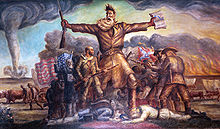
John Brown’s Raid and North Carolina:
“Scarcely had he [President James Buchanan] returned to Washington when John Brown
made his raid on Harper’s Ferry. The story of the reaction of the North and the South toward
Brown’s raid and his subsequent execution is too familiar to need repetition. The raid itself
frightened the South, since no man could tell how far Brown’s conspiracy extended; but the
South had no doubt of its ability to handle that phase of the problem.
What most alarmed and horrified the Southern people was the expression of Northern sentiment
toward the criminal; and the extent to which the anti-slavery fanaticism might go was
borne in upon Southerners by Emerson’s exclamation that Brown
“has made the gallows as glorious as the cross.”
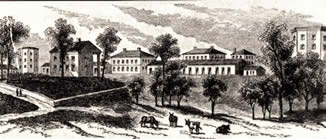
North Carolina, of course, fully shared the sentiments of her sister Southern States.
There was a general demand for military preparations; new military companies were organized;
and Governor Ellis requested the War Department to send and additional supply of arms to the
Federal arsenal at Fayetteville. The political effects were equally as great. The [Raleigh] Standard
declared that unless the South could be assured of protection in the Union it would have to
“sunder the bonds,” and the Register echoed the sentiment. In December the Council of State
resolved that, “If we cannot…enjoy repose and tranquility in the Union, we will be constrained,
in justice to ourselves and our posterity, to establish new forms….[of union].”
(North Carolina, Rebuilding an Ancient Commonwealth, Vol. II, R.D.W. Conner,
American Historical Society, 1929, pp. 124-125)
Alexander H. Stephens on Citizenship and Sovereignty
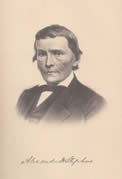
“Is there any such thing as a citizen of the United States, apart from citizenship of a particular State
or Territory of the United States? To me it seems most clearly there is not. We are all citizens
of particular States, Territories, or Districts of the United States,
and thereby only, citizens of the United States.
I was a citizen of Georgia; being a citizen of Georgia, I became, thereby, a citizen of the United States,
only because Georgia was one of the United States under the Constitution, which was the bond, or compact,
of the Union between the States thus united. Had Georgia never united with the other States, her people
would never have been, in any sense of the word, citizens of the United States.
The only power Congress has, under the Constitution, on [the subject of naturalized foreigners],
is to make uniform rules of naturalization. Before this power was delegated to Congress, each State,
as all other Sovereign, independent nations, had the uncontrolled right to admit foreigners to citizenship,
upon terms as each, for itself, saw fit.
The government of the United States was created by the States. All its powers are held in trust by
delegation from the States. These powers are strict and limited. The Paramount authority in this country,
Sovereignty, that to which allegiance is due, is with the People somewhere. There is no Sovereignty
either in the General Government or the State Governments. Sovereignty itself, from which emanates
all political power, I repeat, remains and ever resides with the People somewhere.
This was the opinion of Alexander Hamilton, who was one of the extremist of the Nationals of his day,
and who never failed to claim all acknowledged, as well as some doubtful, or questionable powers,
which tended to strengthen the Federal Government.
(A Constitutional View of the Late War Between the States, Alexander H. Stephens, Volume I, pp. 34-41)
A Modern View of Secession:
“The withdrawal of a commonwealth from a federation does not constitute rebellion, much less treason,
either in political theory or in international law. There are those who will say that the States of the Union did not
have a right to secede. They are wrong, but let us concede the point.
The Virginians and Carolinians of the 1860’s certainly had better right to secede than their fathers and grandfathers
who liberated their States from British rule, and yet we are not ashamed of Washington and Adams, and we do not
curse the memory of these traitors to the only lawfully constituted authority that had been conceivable from the time
John Smith set foot in Virginia.
The government of Andrew Johnson had wanted to try Jefferson Davis for treason, but the President thought
better of it when he realized that world opinion would be solidly against him.”
Thomas Fleming, Southern Men, American Persons, May, 1994
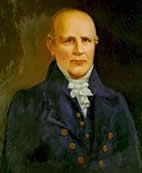
Nathaniel Macon of Warrenton
Buck Springs, February 9, 1833
“Sir: I have received your letter of the 24th ulto.
I never believed that a State could nullify and remain in the Union, but always believed that a State
could secede when she pleased, provided she would pay her proportion of the public debt. This right
I have considered the best guard to public liberty and the public justice that could be desired, and it
ought to have prevented what is now felt in the South – oppression.
A government of opinion established by sovereign States cannot be maintained by force.
The use of force makes enemies, and enemies cannot live in peace.”
Nathaniel Macon (Letter to S.P. Carson)
North Carolina's Viewpoint Toward Federal Relations and Self-Determination:
"North Carolinians of 1776 were highly particularistic and, when once the bond which united them to
Great Britain had been severed, they recognized no authority outside the borders of the State which might
control or in any way limit their freedom of action. When, therefore, they came to the task of constitution
making, it was of their own accord and not under the compulsion, instruction or permission of the Continental Congress.
The doctrine of Abraham Lincoln that “The Union is older than any of the States and, in fact, it created them
as States,” was undreamed of by them. Quite the contrary was their view.
The resolution of April 12, 1776, instructing the members of the Continental Congress to vote for independence,
specifically reserved “to this colony the sole and exclusive power of forming a constitution and laws for this Colony,”
and when the constitution of 1776 was framed and put into effect they saw no relation to the Union in the act.
They ratified the Articles of Confederation by their free choice without any sense of compulsion, feeling
equally free to reject it should that seem a wiser choice.
The provision of the Articles [of Confederation] that “Each State retains its sovereignty, freedom and independence,
and every power, jurisdiction, and right, which is not by this confederation expressly delegated to the United States,
in Congress assembled,” is a completely accurate statement of North Carolina’s view and the proper and
actual relationship of the State and the Union…”
(Secession in North Carolina, J.G. de R.Hamilton)
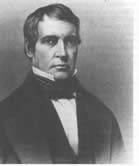
William Rufus King of Sampson County
"Like his illustrious prototype, John C. Calhoun, he battled for the rights of his State, in order to
secure that harmony between Federal and State power, which is the essence of the Union, and without
which it is impossible to preserve our system of self-government.
In the memorable session of 1849-1850, Mr. King voted for nearly all the compromise measures
as an act of devotion to the National Union, without surrendering a single cardinal point of the political
faith which had guided him through life, and had secured to him the affection and attachment of
the citizens of his own State.
In the sectional controversies of the 1840’s, King counseled patience, and optimistically expected the
North to respect the constitutional rights of the Southern States. He warned the North that if their section’s
actions jeopardized those rights---both constitutional and material---all Southern men should “hurl defiance
at the fanatical crew and unitedly determine to defend their rights at every hazard and every sacrifice.”
Abolition’s Leprous Spot Upon Our Body Politic:
(Speech (excerpts) of Thomas N. Crumpler, of Ashe County, on Federal Relations,
Delivered in the House of Commons, January 10, 1861)
“But Mr. Chairman, it must not be supposed that I hold the disunionists,
even the disunionists per se, to be the only persons responsible for the evils that are upon us.
There is another class –the Abolitionists of the North – who are primarily responsible and most guilty
in this matter. With hearts full of treason to the spirit of the Constitution, they have, for years, been digging
at the foundation of our Government. Filled themselves with all that is pestilent, they are, and have been,
the leprous spot upon our body politic. Enemies of our country, they deserve execration. Their mischievous
and wicked acts, while benefiting neither themselves or the objects of their hypocritical sympathies, have
furnished the disunionists with the materials for their plot against the Union.
The value of the Union demands that the effort should be made. The horrors of the war that will follow
dissolution demand it. Those horrors I shall not attempt to paint. I do not care to speak of that day, when
we shall look to every corner as the messenger of evil tidings…Each man for himself can better imagine the
scenes of those calamitous days than I can portray them, and each one knows that it is no fancy sketch,
but unless the tide of revolution is arrested, the horrible picture will soon be drawn in blood,
and lighted up with flame.
I think the Union can yet be preserved. The Lincoln administration is powerless to harm us.
Let us labor for this result, and even if we do fail, and in civil war we are called to die upon some gory
field far from home and kindred, it will not be unpleasant to reflect in the last hour, that we strove to avert
the ruin of our country. And if success crowns your efforts, to the latest day of our lives we will enjoy the
satisfaction of having contributed our humble assistance in transmitting to posterity the blessings of this
great and free government, founded by our fathers.”
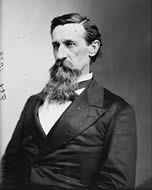
Representative James Madison Leach of Randolph County
While Jefferson Davis of Mississippi pleaded in the United States Senate for his elected
colleagues to help save the Union in January, 1861, Congressman James M. Leach pleaded
in the House of Representatives for peaceful settlement of the secession crisis, and rightly pointed
to the North’s responsibility for the condition of the country. His respected desire for peace
underscores the fact that North Carolina was indeed a “State forced out of the Union.”
The South Needs Constitutional Guarantees to Remain in the Union:
“[The] North Carolina representatives in the Senate and House of the United States Congress
were struggling with the problem of peace. Representative Warren Winslow, on January 22 [1861],
“by unanimous consent, presented to the House the proceedings of a meeting by the citizens
of Columbia, North Carolina, in reference to the condition of the country.”
It was promptly “laid on the table.”
Representative James M. Leach [stated that the] “Lexington [North Carolina] citizens had
approved resolutions designed to lead to “a settlement of our national troubles….based
on the Crittenden propositions.” Leach urged the House to read and consider the resolution
“with the hope that North Carolina might be in some degree
instrumental in effecting an adjustment of our difficulties.”
Winslow said he was willing to exert all of his power to effect a suitable settlement to
preserve the Union, but in his judgment “no patched up compromise, no alleviating and
palliating remedy” was either just or prudent. He said he did not subscribe to the dogma
that the Union should be preserved “at all hazards.’
With reference to the reluctance with which North Carolina ratified the original Constitution
of the United States, he said North Carolina was thus reluctant because it feared the
consequences “which have sadly been realized.” When it did come into the Union
it came with loyal purposes to adhere to its obligations, and would then take course
which her honor, interest and obligation to the other States justified.
James M. Leach, in a State of the Union message on February 7, said…Unless there
was a return to the obligations of the Constitution, however, and a recognition of the
equality of all the States and a guarantee of the rights of the South by the people of the
North, he said peace could not be preserved. He pleaded with the House to join him
and so legislate as to bring the rebellious States back into the Union.
Leach [said what] was needed were such guarantees as would satisfy the Border States
and induce them not only to remain in the Union, but to exert their good offices as mediators
between the extremes of both sections. By following this course….Leach believed the border
States would “endeavor to influence those [seceded] States to remain in the Union,
but if a coercive policy is adopted [by the administration], all is lost.”
(North Carolina in 1861, James H. Boykin, Bookman Associates, 1961, pp. 149-152)
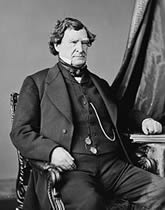
Judge Black’s opinion of November 20, 1860, submitted to President James Buchanan
Faced with a growing secession crisis in the last year of his term, President Buchanan
asked his Attorney-General and fellow Pennsylvanian Judge Jeremiah S. Black for information regarding
his legal powers as president. Buchanan felt that he could have mobilized militia to achieve enforcement
of federal laws under the Act of 1795 which provided that the militia could be called “whenever the laws
of the United States have been opposed…by any State, by any combinations too powerful to be suppressed
by the ordinary course of legal proceedings.”
He then realized that he would first have to move troops against Massachusetts, Wisconsin, and the
other Northern States whose Personal Liberty Laws had undermined enforcement of the Federal Fugitive
Slave Act. These States had committed overt acts of defiance of federal law, as yet South Carolina had not.
The President could not march against a people who only talked against the federal government,
ignoring States which had for years been actively obstructing the course of federal law.
If one holds the belief that the Southern States, despite secession, had not left the union, then the
federal government was Constitution-bound to protect them; e.g., South Carolina against
troops from the New England States.
“Whether Congress has the constitutional right to make war upon one or more States, and require
the Executive of the Federal Government to carry it on by means of force to be drawn from the other
States, is a question for Congress itself to consider.
It must be admitted that no such power is expressly given; nor are there any words in the Constitution
which imply it. Among the powers enumerated in Article 1, Section 8, [it] certainly means nothing
more than the power to commence and carry on hostilities against the foreign enemies of the nation.
Another clause, in the same section gives Congress the power “to provide for calling forth the militia,”
and to use them within the limits of the State. But this power is also restricted by the words which
immediately follow that it can be exercised only for one of the following purposes: To execute the
laws of the Union;….To suppress insurrections against the State; but this is confined by Article 4,
Section 4, to cases in which the State itself shall apply for assistance against her own people.
[And] 3. To repel the invasion of a State by enemies who come from abroad to assail her in her own
territory. All these provisions are made to protect the States, not to authorize an attack by one part
of the country by another; to preserve the peace, and not to plunge them into civil war. Our forefathers
do not seem to have thought that war was calculated “to form a more perfect Union, establish justice,
insure domestic tranquility, provide for the common defense, promote the general welfare, and
secure the blessings of liberty to ourselves and our posterity.”
There was undoubtedly a strong and universal conviction among the men who framed and
ratified the Constitution, that military force would not only be useless, but pernicious,
as a means of holding the States together.
If it is true that war cannot be declared, nor a system of general hostilities carried on by the Central
Government against a State, then it seems to follow that an attempt to do so would be ipso facto
an expulsion of such State from the Union. Being treated as an alien and enemy,
she would be compelled to act accordingly.
And if Congress shall break up the present Union by unconstitutionally putting strife and enmity and
armed hostility between different sections of the country, instead of the domestic tranquility which
the Constitution was meant to insure, will not all the States be absolved from their Federal obligations?”
Twenty Years of Congress, James G. Blaine, Volume I, pp. 604-605)
Sources & Bibliography
Reminiscences and Memoirs of North Carolina and Eminent North Carolinians, John H. Wheeler, Columbus Printing, 1884
Secession in North Carolina, J.G. de R. Hamilton, North Carolina in the WBTS, D.H. Hill, editor, Edwards and Broughton, 1926
The Pursuit of Southern History, George B. Tindall, editor, LSU Press, 1964
Zeb Vance, Champion of Personal Freedom, Bobbs-Merrill Company, 1965
Twenty Years of Congress, James G. Blaine, Volume I, Henry Hill Publishing Company, 1884
North Carolina in 1861, James H. Boykin, Bookman Associates, 1961
The Natural Superiority of Southern Politicians, A Revisionist History, David Leon Chandler, Doubleday & Company, 1977
Copyright 2011, North Carolina War Between the States Sesquicentennial Commission